|
Ffynnongynydd School Logs from 1878 to1962
1878 : The School Inspector notes that the children
are “very backward, many having been to school but little.....
They are tolerably punctual but very irregular in attendance....
wanting in discipline as well as in order and method.”
The Inspector’s report for 1880 advised
that the general efficiency of the school did not reach higher
than “pretty fair”. Arithmetic was particularly weak
– of the 11 children presented in 3rd and 4th standards
10 did not work out 1 sum correctly.
1881 : A new teacher arrived – Kate Rowlett.
1883 : November 9th, – register not marked. Only 15 present
– most of boys away beating.
1884 : August A new teacher arrived, Tom Halstead.
1885 : Inspector’s Report: “ decided
improvement.. now, without doubt a good school... want of style
in reading and recitation.... manners require attention.”
1886 :
June 4th: Albert Price playing truant 2 weeks. Refused to come
to school so his mother brought him yesterday morning with a rope
tied round his arm. He promises not to repeat the offence in future.
Inspector’s Report: “This school is steadily working
its way to the front rank... manners becoming worthy of praise....
slatework of first standard; paperwork of second standard”.
1887 :
Some very bad attendees.
Inspector’ Report: Excellent in elementary subjects + English,
Geography and singing by rote, +girls’ needlework. Creditable
success under the circumstances. Reading fairly expressive and
would have been satisfactory if the children were taught to speak
more distinctly. Arithmetic perhaps the best subject.
July 1st: holidays begin – school cleaned and coloured.
1888 :
75 on books.
April 20th – primrose gathering
1890 :
1st February – attendance down – boys beating.
Feb. 17th- so many away with colds, sore throats that school closed
for a week.
Feb. 24th – reopened but still so few that school closed
again for a week.
New teacher arrived: Mr H. Humpherson.
Attendance down in August – children mushrooming. Some boys
are working, despite warnings that they should still be in school.
List of absentees, varying from 5 – 12 weeks sent to the
Attendance Officer.
1891 :
March 19th: Severe snow – lanes choked up and drifts of
3 to 4 feet. No children in school.
March 24th: half day holiday for Band of Hope and Sunday School
treats.
April 30th: Closed for 1 month due to prevalence of Scarlett Fever
and flu – by order of medical officer.
Reopened 25th may with 20 present.
Inspector’s Report:
Premises much improved...as a school is not only a place for instruction
but also for the formation of right habits it is hoped that the
Managers will receive the hearty support of the new master, when
appointed...... Fair to average but arithmetic weak; reading and
recitation need much improvement... handwriting satisfactory..
needlework fair... the practice of counting on fingers and by
strokes should be discouraged”.
September – whooping cough.
Dec, 7th – severe storm - all wet through – clothes
dried in front of fire. 22 present.
1 girl absent for 12 weeks reported to be attending a dame school.
Dec. 18th – finish at 3.30 p.m so children can get home
before dark.
1892 :
Jan 18th – closed for a week due to snow.
April 27th – half day holiday for Eisteddfod in village.
May 20th – holiday: sports etc. In Maesllwch Park to celebrate
marriage of Walter de Winton.
Attendance poor all week due to Hay Fair which is regarded by
all in the neighbourhood more or less as a festival week. Little
work done and few attend school.
May 6th: attendance poor due to potato planting.
Inspectors Report: “Suffers greatly from irregular attendance
and sickness... after due allowance we cannot regard the results
as satisfactory... marked lack of intelligence in every class.......Infants
especially backward... impossible to recommend payment of special
grant under Act 105...Condition of the school as a whole almost
warrants a formal warning under Act 86.
1893 :
A new teacher, Thomas Amos arrived. There were 76 pupils on the
register. He decided to award prizes to improve attendance and
standard of work and visited parents in an attempt to improve
attendance.
His efforts seemed to bear fruit as there were 72 present for
exams on March 8th; attendance to May was 53% - an improvement
on the previous year’s 37% and the Inspectors’ Report
was “much improved... still a lot to do but satisfactory
progress in elementary subjects.”.
July 6th – treat for all, plus neighbouring schools, in
Maesllwch Park.
A pupil teacher arrived this year – Edward Betts and in
November attendance was 75%. However, Scarlett fever broke out
and the school had to be disinfected.
November 24th – Temperance Entertainment given at the school
by scholars who had been formed into a “Band of Hope”
– having given the same entertainment at Glasbury Assembly
room the previous Wednesday.
1894 :
School disinfected 3 times by Inspector of Nuisance.
1895 :
January: severely cold – sewing had to be given up on account
of very cold hands; children come in groups of 6 to warm but soon
complain again and so process has to go on again whole of the
day. Bad weather continued.
Feb. 4th – severe cold. Thermometer registers from 2 to
4 below 0. Impossible to keep children warm and comfortable unless
they sit by the fire.
1st March – still very cold.
15th April – attendance fluctuates this week on account
of fairs, distribution of charity bread etc.
20th April - managers finally settled to build a classroom, cloakroom
for the girls and reconstruction of offices.
30 April: end of school year – attendance 70.2 %. New year
started on 1st May with 89 pupils registered.
Inspectors’ Report: Attendance improved but no improvement
in standards....arithmetic fair; mental arithmetic moderate; reading
and recitation lacking in expression; handwriting indifferent;
spelling very weak. A marked improvement will be expected next
year if the school is to escape a warning under Article 86...
September: Scarlett fever at 1 farm, brought from Boughrood by
a child residing there with grandparents.
September 2nd: Opened school with 60 scholars present. School
very much improved by the addition of a large classroom and cloakroom.
Able to use the new rooms but the woodwork has not been painted
yet. Intended to finish things this week.
18 October – attendance low – children picking potatoes
and apples.
25 October – more cases of scarlet fever and diphtheria.
30th October – children dismissed early owing to Bazaar
in the Assembly Rooms in aid of school building fund - £105
raised.
4th November – all the boys will be absent due to the shoot
– used as “stops” to prevent pheasant etc. running
out from covers.
1896:
26 March – children attended a lecture on temperance in
the Assembly Rooms so no school until 1.00 p.m.
14 April – closed for a week – measles in every home.
Attendance at the end of the school year – 67.4%.
Inspectors’ Report: No great improvement. Managers must
have pigsty and fowlhouses removed from yard and placed at a good
distance away from schoolhouse and playground.
Sept. 7th – treat for children at Maesllwch Castle at 4.30
p.m. – tea, cake, buns, tarts, sweets and apples. Also present:
Violet and Lola de Winton, Mrs Griffiths, Miss E Battiscombe,
Mrs Nott, Miss Lloyd.
Oct 30th – pupils with diphtheria.
Nov 3rd– Lizzie Lewis died last Sunday of diphtheria. Teachers
and Scholars sent a beautiful wreath. She was an exemplary scholar
– teachers and scholars were very fond of her.
1897 :
88 on register – 46 boys and 42 girls.
Inspectors Report: hampered by want of desk accommodation. Handwriting
not above fair, some poor. Spelling weak in 3rd and 4th standards
and reading in 1st. In other standards reading too mechanical;
grammar fairly good. Recitation and needlework fair.
28 May – Edward Betts’ last day.
22nd June – Diamond Jubilee – pupils let out at 1.30
p.m. and marched down to Maesllwch Park; tea provided as well
as sports and prizes. Children sang, accompanied by Glasbury Brass
Band. Every child in parish under 15 received a jubilee medal.
13 July : Gwen Lewis, scholar in the 3rd Standard died very suddenly
last night about 11 o’clock from a fit. She had been absent
from school during Monday afternoon, minding her baby brother.
About 8.30 p.m. she and her little brother, Pryce, were sent to
Glasbury to fetch some articles from the shop. On the way home
she had the fit. Her father who had gone to meet the children
carried her home. I went immediately on a bicycle to Hay for Sister
Hinks but she was dead before she arrived. She had a fit in the
cloakroom on whit Tuesday by coming in to school at 9.00 a.m.
She did not seem any the worse for that as she preferred to stay
in school rather than go home. She was a dear, sweet child.
Friday, 16th July: All the children attended the funeral of Gwen
Lewis today at 4.00 p.m. Attendance has been very good and so
has progress but a certain gloom hangs over the school this week
on account of the sudden death of one of the little scholars.
3rd Nov – many absent picking blackberries and elderberries.
1 Dec – shooting. A great deal of irregularity is caused
during the winter months by the gentry taking the boys out with
them on this shooting excursion.
1898 :
4 Jan – treat given in assembly room by Col. Rhodes of the
Castle – tea, cakes, crackers and oranges and magic lantern
entertainment.
7 Jan – children gave entertainment in Assembly Rooms raising
£3.
Inspectors’ Report:
Fallen off very considerably in attainment since last inspection
and now in a very backward state... unless great improvement be
effected next year the school will be declared insufficient.
July – attendance poor due to hay making.
7 Oct – many absent picking potatoes, apples, blackberries
etc. Have spoken to parents several times but as often as they
want the children they keep them at home.
21 Oct – deputation of teachers to wait upon Hay Attendance
Committee on 3rd November to impress upon the Committee the importance
of regular attendance and to suggest means of improvement.
1899 :
21 April – many absent chiefly on account of taking care
of their young geese.
Average attendance 62.4%.
Inspectors’ Report :
Improved and in a fairly satisfactory state of efficiency.
Gwladys Ammonds – pupil teacher arrived.
1900 :
9 Jan – rummage sale in assembly room in aid of school needlework
fund.
Inspectors’ Report: Elementary subjects in most respects
satisfactory. No water on premises and no lavatory supplied. A
sufficient supply of water must be provided for drinking and washing.
Feb. 14th: School closed – very heavy snow storm.
Feb 15th: Snow a foot deep and all roads filled with snowdrifts.
May 4th: Attendance low. Several parents think they can keep the
children at home as much as they like during summer time, especially
after HM Inspector’s visit.
August: An extra week’s holiday granted because of wet weather
prolonging the harvest. Due notice given to HM Inspectorate.
11the Sep: Treat: The children enjoyed a splendid treat –
110 present – organised by the Vicar, Rev. Griffiths, Mrs
Griffiths, Miss de Winton, Sir Francis and Lady de Winton. Games
were indulged in: a scramble for apples, sweets etc. races etc.
The children sang some songs and gave hearty cheers to the contributors.
10th Oct. – holiday for the general election.
12th Oct: attendance not so good – potato picking, blackberrying
and acorn picking.
16 Nov: boys shooting – they get 1 shilling a day which
enables them to get a new pair of boots or a suit of clothes for
winter.
30th Nov: Surveyor visited school and took level distance from
the well to the school: Height of school floor above well 27.5
feet Distance from well 170 yards There is now every prospect
of getting water supply at an early date. Over £20 obtained
by entertainment and jumble sale for that purpose.
1901 :
May 1st: Cottage gardening commenced today as an extra subject.
The boys delighted with the new occupation.
Inspector’s Report June:
Good progress during the past year and now in a satisfactory state
of efficiency Many of the desks are old and not very suitable
for teaching purposes.
4th Sept.: Treat – now an annual event. School photograph
in 2 groups.
27th Sept. Whooping cough.
11th Oct: medical officer advised closing school and said we should
have closed at the first appearance of whooping cough. 3 little
children have died during these 3 weeks.
Nov 4th. Reopened.
1902 :
13th Jan: Diphtheria.
23rd May – Holiday; the late Miss de Winton’s funeral.
The teachers and scholars sent a wreath in affectionate remembrance
of the many kindnesses received from this good lady. She was a
subscriber to the school and very kind to the children.
Inspector’s Report June:
Considerable difficulties owing to sickness which affected attendance.
In spite of this drawback work is very satisfactory..... Cottage
gardening taught with much success to older boys.
26th June: holiday for the coronation. Intercessional service
in church and tea and sports in Maesllwch Park.
1st Sept.– measles; school closed for 1 week.
6th Oct. – Fires lit. The weather is very cold. The children
having had the measles lately are naturally rather tender and
many attract severe colds.
17th Nov. – Had a request from Cpt. De Winton for 25 boys
to act as “stops” on Tuesday, Wednesday and Thursday.
The children were provided this holiday instead of Coronation
week. The boys get 1/9 per day for this, and that money helps
the parents to get new boots and clothes for the winter. Only
the best boys are asked to go.
24th Dec. – Will not give any Christmas holidays, only Christmas
Day and Boxing Day. It is much better to give the children a holiday
when the snow is deep, or when the gentry require stops.
1903 :
3rd Jan. – The Christmas tree was given at Maesllwch Castle
last Saturday; over 100 children present. They had tea, cakes
etc. and 2 or 3 presents from the tree. Oranges were distributed
when the children left for home.
1st June – Holiday - Whit Monday – Foresters week
and sport in Maesllwch park.
24th June – Holiday – eisteddfod in Glasbury.
29th Sept – last day under old management – transfer
tomorrow to the County Council.
30th Sept – new management, new registers.
5th Oct. – measles.
9th Oct – Treat at All Saints Vicarage. Mrs Griffiths goes
around the wealthy parishioners and asks them to give something
towards the treat. When all is brought together it forms an excellent
meal for the children. The teachers and scholars greatly appreciate
the kindness of the donors.
16th Oct. – The new managers held their first meeting under
the new Education Act at the School at 4.30 p.m. The necessary repairs
and improvements in accordance with the County Surveyor’s
report where ordered to be carried out.
1904 :
21st March – whooping cough.
21st July: holiday – king and queen visited county to open
the Birmingham Waterworks in the Elan Valley.
Inspector’s Report:
School continues to be satisfactorily conducted... Arithmetic
is well taught.... Staff not sufficient to satisfy Article 105
of Code of 1903.
26th Sept. Measles epidemic – closed for 2 weeks.
Oct, 3rd – Agnes Mary Lyke – pupil teacher started.
1905:
15 May – Charles and Nestor Lewis left today for California
where their father resides. Children and teachers presented them
with a knife each as well as 3 shillings each to purchase whatever
they liked. The children felt the parting very much.
Inspector’s Report :
Very satisfactory state of efficiency. Hard work suffers from
want of suitable exercise books.
1909 :
July 27th: Scarlett fever broken out in Cwmbach in the house of
Mr T Lloyd and Lily Lloyd, a pupil at the school, is ill with
the fever as well as an uncle living in the same house. A grandchild
of Mr Lloyd, Charles Smart, came on a visit from Pendarren and
previous to this visit he had been in hospital with Scarlett Fever.
He was also admitted into this school on 22nd.
1911 :
Feb 21st: boy sent home with the “itch”; his mother
came in and was told what to do.
Feb 22nd – 4 sent home suffering the “itch”.
31st March – several away with scabies, shingles and eczema.
14th July – The scholars are present with coronation mugs,
the give of Mrs Morgan, Boughrood Castle.
5th Oct. – Nellie Holder, a child of 8 years, broke her
collar bone by falling from the swing at 11.10 a.m. She was eating
a per and was not holding to the wire suspenders of the swing.
Dr. Jayne set the bone.
1913 :
Jan 14 – Cpt. and Mrs Synge brought 3 large tins of hot
soup for the children at 12.30. 33 partook, each paying ½pence
for as much as they could eat. They will come every Tuesday and
Thursday in winter. They also supply basins and the children bring
their own spoons.
28th Feb: attendance bad – children being kept by parents
to carry firewood, the woods being now open for the cottagers
to get firewood.
1914 :
30th Jan. – the cooking van arrived and was fixed on the
common near the school.
4th Feb. – Cooking lessons began today at the van. 12 is
the full complement; there are included 3 from Llowes.
Feb 23rd – School closed for 1 week owing to the death of
the Headmaster, Mr W.J. Amos.
May 25th: Henry Kerr Lupton commenced duties as Headteacher.
10th June – Holiday – children invited to coming-of-age
festivities at Maesllwch Castle.
Sept.11th: Miss Winnie Jones, Student Teacher, commenced duties.
Nov, 19th: a farm labourer from Lower Pentre has for a long time
been interfering with the children and swearing. Today I caught
him and unmercifully thrashed him.
Nov 23rd: I have today received a summons to appear at Clyro in
respect of the assault on Phillips. I wish to place on record
that is it only after warnings oft repeated that I took the law
into my own hands. I have had complaints that Phillips has:
1. Frightened the children going home.
2. Run them right to the school door.
3. Used filthy language to the girls.
4. Bursted the boys’ footballs and broken the goal posts.
5. Sent insulting messages to me by my little daughter.
6. Insulted Mrs Lupton in the presence of scholars.
7. Shouted from a distance during drill lessons.
I asked his master (Mr Lewis, Lower Pentre) to
correct him 3 months ago. Apparently nothing has been done so
to put an end to this nonsense I took the law into my own hands
and thrashed him.
Nov. 30th: Left school at 10.00 a.m. to attend court at Clyro.
Phillips severely censured and warned by the bench.
1915 :
Jan. 11th : piano arrived.
Feb. 24th: Infants’ room full of smoke; fire had to be put
out and infants worked in the big room.
March 29th: closed for 2 weeks due to measles.
August 9th: Bessie Jones, Bessie Hobbs and Reggie Gardner are
reported as having left to attend Hampton Grammar School.
Sept. 13th: 90 pupils on roll.
Nov. 8th: commenced cocoa club today for the winter. Each child
pays 1pence weekly and receives a mug of cocoa daily.
Nov. 29th: 9 girls attended the war time cookery lectures from
Monday to Friday.
1916 :
Jan. 3rd: 85 on roll; 53 absent with mumps.
March 6th: chimney pots have been put on and the difference is
remarkable – there has been no smoke in school since.
May 18th: Master received notice to report himself for military
service at Knighton on 2nd June.
May 24th: Empire Day – the vicar addressed the school and
saluted the flag at mid-day.
June 5th: Headmaster retained in military service.
July 10th: Miss Harper commenced duties as Supplementary Teacher
and has charge of the infants’ room.
Oct. 2nd: School closed for 2 weeks due to impetigo on Doctor’s
orders.
Dec. 5th: School closed for the day to allow me to bring my little
daughter home by car from Gloucester Hospital – as incurable
(she had “infant paralysis”).
Dec. 12th: Sent 7 shillings to the Overseas Club for Christmas
presents for the soldiers – collected by the children.
1917 :
Jan. 9th: a holiday has been granted for the day as wounded soldiers
are being entertained to a concert at the parish room and the
schoolchildren are invited.
Jan. 27th: Children very keen on War Savings Scheme.
Feb. 12th: Headmaster discharged (returned 12th March).
May 15th: Sent notes to parents about children being sleepy in
school – I rather think that owing to the Daylight Saving
Bill the children are late going to sleep.
Inspector’s Report (March 19th):
Very good work is done in this school. The special attention paid
to local geography and history, the keeping of notebooks in several
subjects, the correlation of gardening and drawing and the compositions
of some of the older children deserve special praise. Much attention
is paid to spelling...... average attendance ... the school is
not as clean as it should be... washing pans out of repair and
no drinking water on the premises.
Oct. 1st: Wilfred Lewis, an old scholar here, has been awarded
the DCM in France; Frank Amos awarded the Military Medal.
Oct. 9th: Took 40 of the older children to Maesllwch Park to collect
chestnut cobs for the manufacture of munitions. 8 cwts. collected.
Oct. 11th: Second collection of chestnut cobs.
Nov. 5th: Alice Haynes of the Green, Glasbury, commenced duties
as supplementary teacher.
Dec. 5th: 48 pairs of clogs arrived from Rochdale. Distributed
to scholars at 7 shillings and sixpence per pair.
1918 :
Jan 22nd: Sent £4.2.6 to the “Weekly Despatch”
for tobacco for Glasbury overseas soldiers – from the Concert
Fund.
Mar. 25th: Arthur Preece, 6 years of age, fell from a moving gambo
and dislocated his collarbone... gave the soldiers who drive the
gambo orders to use the whip on any scholars attempting to mount
the gambo.
June 18th: Children sent £1.18.0 to Overseas Club for tobacco
for soldiers.
Oct. 15th: Left school in charge of Miss Haynes this afternoon
to lay charge of false pretence and larceny against a Russian
called Kutsiouchenki at Hay Police Station. Remanded until 15th.
Oct. 18th: Left school at 11 a.m. to attend trial at Hay. I recovered
money and property. This prisoner sent to 3 months’ imprisonment.
Dec. 20th: this school has won the banner for the 3rd year in
succession – 1916, 1917, 1918. In lieu of the banner a library
has been presented to the school.
1919 :
64 pupils registered; the lowest in the history of the school.
Inspector’s Report (March):
A highly satisfactory standard of work is maintained in the various
subjects.
Sept. 30th: Charles Jones, Pool, aged 10 years is being employed
by... I wrote to no avail and reported the case.
Oct. 27th: Charles Jones returned to school.
1920 :
Feb. 23rd: Master called to Llandrindod to a special meeting.
May 6th; Serious charges made against the late headmaster, Mr
Lupton, and which after an enquiry by the Managers and the Clerk
to the L.E.A. , led to the resignation of both Mr and Mrs Lupton,
since the latter could not stay after her husband left and which
unfortunate occurrence has interfered with the school work for
nearly a month past. Attendance now become normal after the considerable
interruption caused.
Sept. 14th: J.H. Dixon, CM, FRHS commenced as head and Blanche
Jones as supplementary teacher.
Sept. 21st: Nellie Haynes employed as student teacher.
Oct. 8th: The longer I stay here the more I regret I ever came.
Old, dilapidated premises, furniture, books, wall decoration,
muddle of cupboards, scarcity of stationery are hourly very trying;
adding to this the disgraceful paperwork and low attainment of
the children and we have state of things which would induce me
to resign at once, but for the fact that it has cost me £35
to remove here.
Dec. 16th: I gave Mrs Evans permission to address the girls on
the subject of Girl Guides with a view to forming a village corps
under the superintendence of Mrs Synge.
1921 :
62 on roll.
Oct. 14th: holiday today as a large number of scholars stated
their parents intended to take them to see Broncho Bill’s
Wild West Show at Hay.
1923 :
Feb.9th: The scholars desks are a daily source of anxiety lest
some limbs should be broken ...... we have had to discard 3 and
use slates instead of paper.
Feb. 16th: wet weather continues. It is impossible to cross from
the road to the school without being over shoe tops in water and
mud.
Dec. 13th: Visit of the Director who examined all apparatus and
stationery – he burnt some and took away a quantity of useless
and disgraceful books.... he promised to replace them at an early
date.
1924 :
Feb. 11th: 22 dual desks arrived... it is a great relief to be
able to put aside most of the old desks which are positively dangerous.
June 2nd: admitted Arthur Hope, infant.
June 26th: 35 scholars taken to Aberystwyth for the day. The railway
journey and 9 hours on the shore were thoroughly enjoyed. The
scholars took lunch with them and 2 meals were provided. The cost
was 6 shillings per head – 2 shillings paid by children,
2 shillings from the Concert Fund and the remainder by the Church
and Wesleyan Sunday Schools. It was the first time that any of
them had seen the sea.
July 14th: admitted Charles Lloyd.
1925 :
Jan. 22nd: annual treat at Maesllwch Caste. After a visit to the
family’s museum the scholars were highly entertained for
1 hour by a conjuror, specially engaged for the occasion. An excellent
tea was provided.
1926 :
51 on roll.
Jan 12th: Construction of footpath commenced.
1927 :
March 4th: Misses Butler called in connection with the Boy Scout
Movement of which they are scout and cub mistresses.
Oct. 31st: the end of my school career of nearly 50 years.
Nov. 1st: Mrs Laura Horton commenced duties with Blanche Jones
and Vera Davies as temporary assistant teachers.
Nov. 18th: Mrs Horton terminated today.
Nov. 21st: Archibald Alfred Bates and Hilda Bates commenced duties,
with Catherine Bond as supplementary teacher.
Dec. 20th: very low temperatures – the ink in desks has
been frozen all day.
1928 :
July 19th: Mr R. Fernie of the Lamb Inn lectured this afternoon
to classes 1 and 2 on his voyage to and life in the Falkland Islands.
Dec. 13th: workmen commenced the installation of heating apparatus.
1929 :
Jan. 28th: Col. and Mrs Clarke, Treble Hill, called with a gift
of 27 books which they had finished with for the school library.
Inspector’s Report (July):
... much impressed with the excellent tone of the school.
1931 :
Jan. 16th: 2 scholars, Charles Bowen and Charles Lloyd, received
certificates won in a competition organised by the Royal Sanitary
Institute.
March 31st: annual scholarship entrance exams held – 7 candidates.
July 6th: Report of school entrance exams shows that Charles Lloyd,
Doris Bowen and Edith Powell have passed and Charles Lloyd has
the highest marks in the examination in English.
July 14th: School closed for teachers to take children to Barry
Island along with the Congregational Chapel Sunday School –
all guests of our manager, Mr W.E. Bagshaw..
Oct. 13th: whole school marched to the road at 1.00p.m. and saluted
the coffin with the remains of Mr E. Davies, the blacksmith, as
it passed. Mr Davies was kind enough every year to allow our infant
classes to visit his forge whenever the lesson on blacksmith came
round.
1932 :
Feb.: Decided to reduce the staff to 2 teachers owing to the fall
in numbers – now 48.
July 8th: Headmaster took 11 boys to Hampton Grammar School to
play a cricket match in which we were hopelessly beaten. This
is the first match we have ever played and did our boys good.
July 15th: Hampton School cricket team were our guests this afternoon
at a match on the common. Our boys were much less nervous and
played wondrously well. We lost by 32 after 2 innings, having
beaten them well in the first innings. The moral effect is wonderful
and has knit our boys together into a team with much esprit de
corps.
July 25th: took our cricket team to Hay to the Grove to play Hay
C of E school. .
July 26th: School closed – 42 children to Porthcawl for
picnic by motor coach at the invitation of Mr Bagshaw; the second
year he has done this.
1933 :
June 6th: 62 children commenced tent making on the common. The
tents are made of sticks and bracken... a custom dating back to
the time of their great grandfathers at least.
June 27th: Trip to Barry Island - all the children above 7 invited,
along with the Congregational Sunday School – paid for by
Mr Bagshaw. There were 100 children and adults.
1934 :
June 30th: Cricket match at Hampton School.
July 6th: Trip to Barry Island
1935 :
4th March: Supply of one third of a pint of milk to children at
a cost to them of ½d daily commenced today. The milk is
drunk after it has been boiled in school at 10.45 playtime. Some
children bring their own milk and this is boiled separately. Mr
J. Hope, New House Farm, has been appointed to supply the milk.
14 children have joined in this Government Scheme.
May 6th: holiday for the celebration of the Silver Jubilee of
King George V. Every parishioner was invited to Maesllwch Park
for sports, high tea, fireworks and to the Begwyns where the Scouts
lighted a bonfire at 10 p.m. Each child was given a mug, a brooch
and a new shilling.
July 5th: trip to Porthcawl.
1936 :
Nov. 16th: school closed as many boys beating for the shoot.
1937 :
May 12th: Coronation day celebrations in Maesllwch Park.
1938 :
July 15th: trip to Barry Island – expenses paid by the Trustees
of Glasbury Fund, founded by the late Mr. W.E. Bagshaw.
Nov. 7th: School closed for older boys to go as beaters to pheasant
shoot; the boys get half a crown in payment and beat from 7.00
a.m to 5.00 p.m.
Dec. 21st: All children invited by Mrs De Winton to a tea party
in the assembly room. The teachers arranged for a cinematograph
entertainment after tea and provided crackers, oranges, sweets
and a toy for each of the 80 children from a grant of £5
from the Bagshaw Trust fund.
1939 :
Sept. 4th: 2 girls, evacuees from Birmingham and London present.
Oct. 26th: Admitted a boy, Norbert Pieber, a refugee from Vienna
who speaks no English.
1940 :
May 27th: Norbert Pieber suddenly interned in the Isle of Man.
1941 :
Jan. 9th: 6 children evacuated from Bootle attended today.
Jan. 17th: 2 more evacuees from Bootle.
May 23rd: Another batch of children from Bootle.
June 17th: 2 more evacuees.
Aug. 4th: Men with tractors began ploughing the common to produce
food.
1942 :
Sept. 14th: Erection of new kitchen in girls’ playground.
It is a shed built of asbestos cladding, 15’ x 12’
with a coal burner, range, slop sink, pantry and concrete table.
Nov. 11th: Hot dinners for children commenced today. 30 children
partook at a charge of 4d per child.
Headmaster wrote to RD Council asking for water supply to be laid
on for the canteen and hand basins. A petition from the neighbours
asking for water to be laid on at the same time.
1944 :
31 on roll.
May 8 – 15: Salute Soldier week for Radnorshire. The amount
invested in this school group is £1210.
May 17th: Closed for Hay Fair.
July 12th: 7 children and 1 teacher evacuated from Surrey.
July 17th: 15 evacuees admitted.
Sept. 3rd: Memorial service for Sam Price, Welsh Guards, killed
at Caen – in all Saints Church. First of the old boys to
make the supreme sacrifice.
Oct. 2nd: Mr J. Morgan, new Headteacher.
1948 :
23 pupils on roll.
1951 :
20 on roll.
Inspector’s Report:
The school premises wear a general air of neglect and the managers
have done very little, presumably from lack of funds, to keep
the premises in a proper state of repair.... hardly a window functions
properly... the ratcatcher from Painscastle pays frequent visits....
1952 :
New head, Mrs Baynham. At the end of the first week of my appointment;
the school is light and airy and has most of the things needed
to make a thoroughly attractive school.
1962 :
16 on roll.
Inspector’s Report:
A considerable improvement has been effected since the publication
of the last report in 1951.
Ffynnongynydd School closed its doors for the last
time in 2012 after 136 years of educating the children of Glasbury.
Sources :
-
Ffynnongynnydd – the school log books lodged in Powys Archive
in Llandrindod Wells.
Fred and Megan Lloyd
Janet Robinson
|
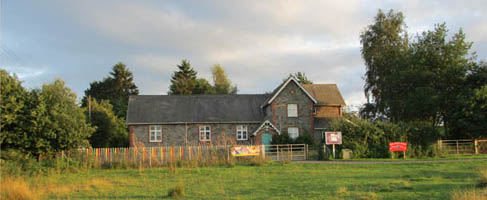
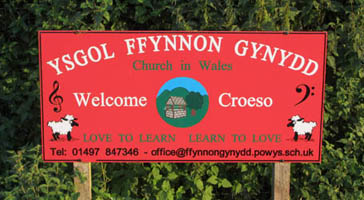
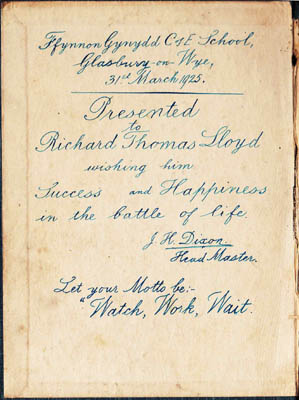
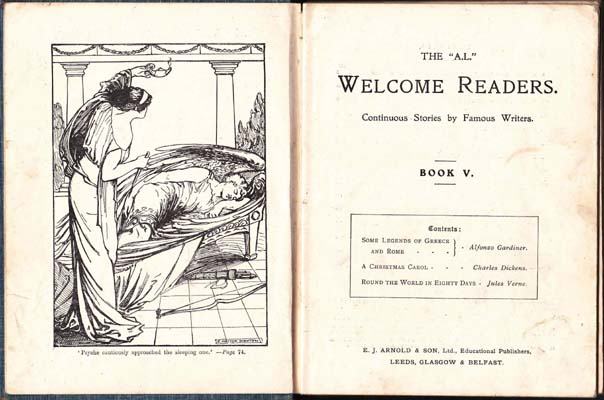
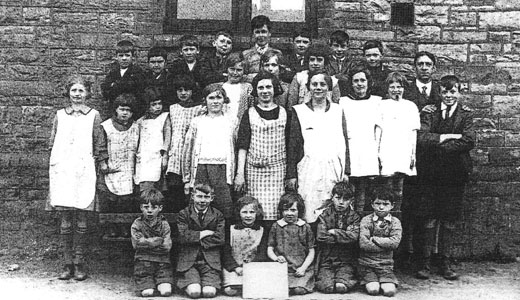
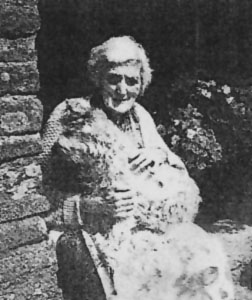
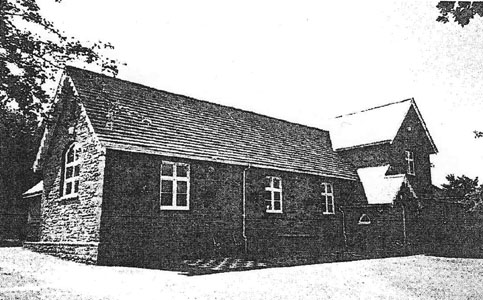 Ffynnon
Gynydd Schooldays (
The School in shown on the right )
Ffynnon
Gynydd Schooldays (
The School in shown on the right )